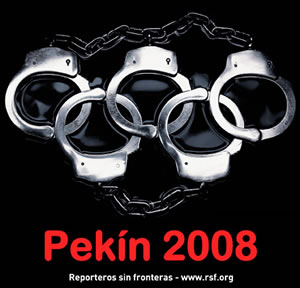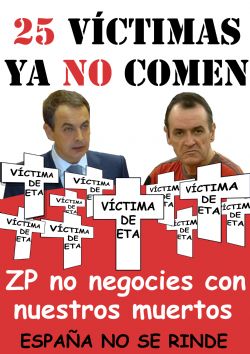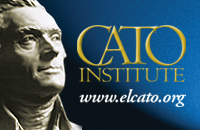Bribes inquiry was warned of ‘another 7/7’, court told – Times Online :
:
«Fraud investigators were told they faced the possibility of “another 7/7” and the likely loss of “British lives on British streets” if they pressed on with inquiries into Saudi Arabia’s arms deals, it was revealed yesterday.
High Court documents showed that the Saudis threatened to cut off intelligence, potentially making it easier for terrorists to attack London, if the Serious Fraud Office (SFO) did not drop its investigation into alleged corruption in deals with BAE systems.
After threats by the Saudis over co-operation in national security issues, the former Prime Minister Tony Blair subjected the SFO to “irresistible pressure” to stop its inquiries, it was claimed.
Lord Justice Moses, hearing a legal challenge to the scrapping of the inquiry, said the Government appeared to have “rolled over” in December 2006.»
Pero es que quién presionó para que se dejara de investigar fue nada más y menos que el ex-Primer Ministro Tony Blair, diciendo que la investigación «sólo dañaría las relaciones económicas y diplomáticas con Arabia Saudí«:
que la investigación «sólo dañaría las relaciones económicas y diplomáticas con Arabia Saudí«:
The Serious Fraud Office last year abruptly canceled its inquiry into the allegations after Tony Blair, the prime minister at the time, said the investigation would threaten thousands of British jobs and affect diplomatic and intelligence ties with Saudi Arabia. Blair had said an investigation would not «have led anywhere, except to the complete wreckage of a vital strategic relationship for our country.» BAE has repeatedly denied wrongdoing.At the judicial review Thursday, the Campaign Against Arms Trade and the Corner House, an anti-bribery group, said the government acted unlawfully in December 2006 when it told the fraud office to stop looking into alleged bribes paid by BAE to Saudi Arabian officials in exchange for arms deals.
Dinah Rose, a lawyer representing the two groups, said new documents showed that BAE Systems wrote to the attorney general confidentially to urge him to halt the investigation for commercial and diplomatic reasons.
Así que ya están pidiendo una nueva investigación:
Pressure groups and lawmakers have urged the government to restart the investigation or face new questions over its commitment to an international anti-bribery convention that says investigations should not be stopped because they could damage relations with other countries.
La cantidad de soborno fue de… dos mil millones de dólares que terminó en cuentas corrientes del Príncide Bandar Bin Sultan de Arabia Saudí y están vinculadas a los pagos provenientes de BAE (o sea, Gran Bretaña) a Arabia Saudí, por un negocio de armas de 1985.
British news media reported last year that more than $2 billion ended up in bank accounts in Washington controlled by Prince Bandar bin Sultan of Saudi Arabia, and that the payments coming from BAE were linked to an arms deal negotiated in 1985. The prince has denied accepting «improper secret commissions.
Por supuesto el príncipe bin Sultan (se tenía que llamar sultán…) lo niega…
Y ¿cuáles eran los grandes intereses comerciales de Gran Bretaña para no investigar?
At the time BAE and the Government were negotiating a key order for Typhoon fighters with the Saudis, a deal that was sealed last year.
En ese momento, BAE y el Gobierno estaban negociando una orden de compra primordial de cazas Typhoon con los saudíes, un negocio que fue concluido el año pasado.
Pero ¡¡¡menudos almas de cántaro!!! Les venden armas ¡¡¡a los que les amenazan con un atentado si no les dejan de investigar los trapos sucios!!! Hmm, claro, la corrupción es muy efectiva: poder y dinero todo en uno. Porque además es definitiva: una vez que alguien ha cobrado algo, ya se le puede chantajear de por vida. ¿Verdad, Bin Sultan?
Hmm, así que ¿quién es el príncipe Bandar Bin Sultan? JW:
This is Prince Bandar, smiling Prince Bandar (President of the Saudi Council for National Security). The one with the estate in Virginia. The one with the vast chalet in Aspen, where he had the top of an entire mountain removed so as to improve his view. The one who has that Plantagenet hunting-lodge outside London. The one who became the longest-serving diplomat in Washington, who entertained so lavishly all of his many good and great friends of both parties. The one who defended the massive thievery of the Al-Saud with his usual actor’s routine, as he served the port and distributed the box of cigars, that «after all, all governments are corrupt and it is only a matter of degree» — and how, after all, could the Americans present, all of them recognizing the corruption in their own government, and of which some of them were no doubt more than observers, disagree?Prince Bandar, the Smiler With the Knyf Under the Cloke, the one who was allowed in, or rather allowed himself in, to secret policy-planning sessions just before the war in Iraq. Prince Bandar, the one who was a regular tennis partner of Colin Powell, to whose wife he gave a jaguar, the very same one she had once possessed, and had let drop in conversation how much she missed it. Prince Bandar –whom did he not touch? Was there a President, or a Secretary of State, or a National Security Advisor, or members of key Congressional committees, or generals preparing arms sales of all kind, from AWACS back in 1980 to the most advanced weaponry now, or people in the Energy Department who never managed to come up with even the semblance of an intelligent energy policy, who never met Prince Bandar?
Así que el Sultán (el presidente del Consejo saudí de la Seguridad Nacional) tiene un rancho en Virginia, un chalet en Aspen -donde retiró la cima de la montaña porque le privaba de vistas ¿¿¿dónde estaban los ecolojetas???- y una casita de caza de estilo Plantagenet en las afueras de Londres. Además, se convirtió en un diplomático al servicio de Washington donde entretenía con largas fiestas a sus amigos (hmm, ¡¡¡qué videos tendrá de los desarrollos privados de las fiestas, dentro de los boudoirs al uso!!!…). Su teoría es que «todos los Gobiernos son corruptos: es sólo una cuestión de grados«.
Se le autorizó para que supiera los planes secretos justo antes de la guerra en Irak. Era un compañero de Colin Powell en los partidos de tenis, con quien jugaba de forma regular. A la mujer de Colin Powell le regaló su jaguar (¿¿a cambio de qué?? ¿los planes secretos?): el mismo Jaguar que la esposa había «perdido», «pérdida» que dio lugar a comentarios.
Termina Hugh Fitzerald preguntándose quién de las personas que manejaban la política internacional americana, no ha tenido una relación con el Príncipe Bandar. Preocupante cuestión…
Eurabia: me da que es un poco más grande que sólo Europa. Y siempre existe una cosa en relación: la corrupción.
Mientras se siguen vendiendo armas a Arabia Saudí: el año pasado :
:
Estados Unidos anunciaba que está planeando vender a Arabia Saudí de 20.000 millones de dólares en sistemas de armamento avanzado, incluyendo kits de Joint Direct Attack Munition o JDAM, que son capaces de transformar las bombas no inteligentes en armas «inteligentes» de precisión dirigida.
On August, 2007, USA announced that it was planning to sell to Saudi Arabia 20 billion dollars in advanced weapon system, including kits of Joint Direct Attack Munition or JDAM, which are capable of transforming the non-intelligent bombs in «intelligen» weapons of directed precision.
Was involved Bandar in this agreement? Is US being also menaced with similar attacks if it doesn’t investigate corruption?
Por cierto, lo he buscado y no se ha publicado en España. ¿Tienen miedo de que nos preguntemos a cambio de qué se está regalando en armamento a Marruecos?
en armamento a Marruecos?
By the way, this has not even been published by any representative/important MSM in Spain. Are they afraid we can begin to ask why Zapatero is giving away
weapons to Morocco? Or the other possibility: Has something been promised by Morocco to Socialist Government to have so bad policy regarding Morocco?
Lots of questions. Riddles in the dark. Gandalf. Lord of the Rings. The Fellowship of the Ring.



 La guerrilla colombiana de las FARC
La guerrilla colombiana de las FARC 





































